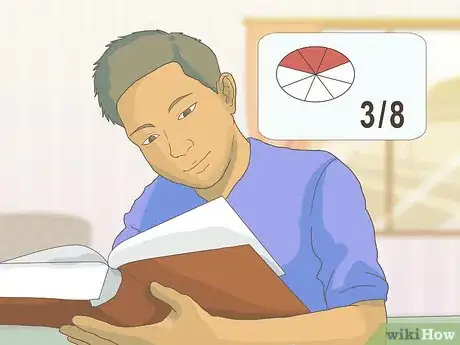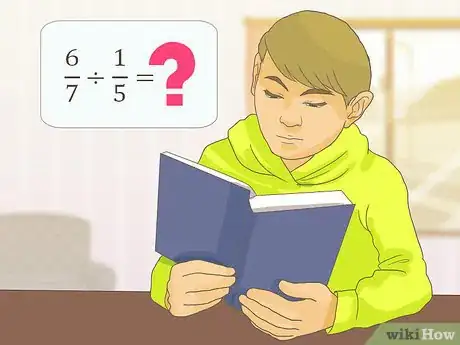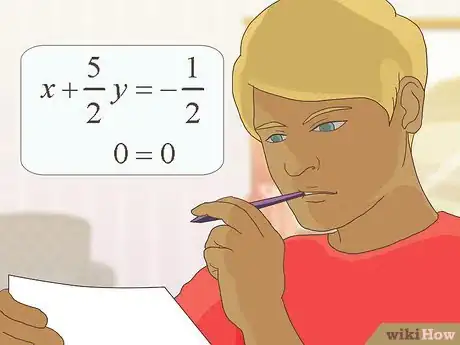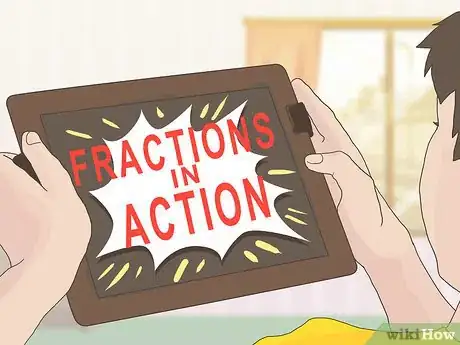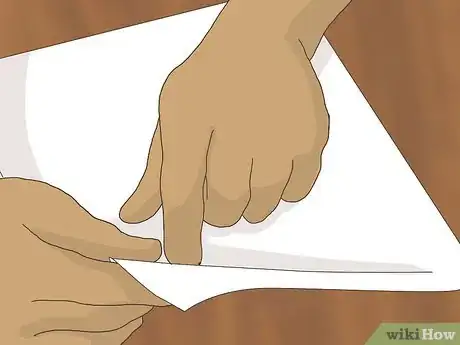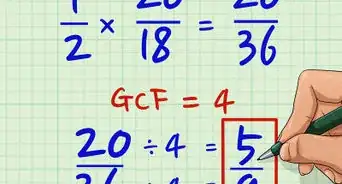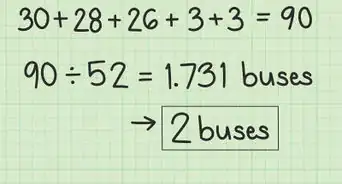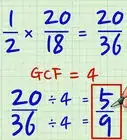This article was co-authored by Daron Cam. Daron Cam is an Academic Tutor and the Founder of Bay Area Tutors, Inc., a San Francisco Bay Area-based tutoring service that provides tutoring in mathematics, science, and overall academic confidence building. Daron has over eight years of teaching math in classrooms and over nine years of one-on-one tutoring experience. He teaches all levels of math including calculus, pre-algebra, algebra I, geometry, and SAT/ACT math prep. Daron holds a BA from the University of California, Berkeley and a math teaching credential from St. Mary's College.
There are 21 references cited in this article, which can be found at the bottom of the page.
This article has been viewed 41,569 times.
Sixth grade math class can be difficult, even for students who have done well in math previously. In sixth grade you begin to learn more advanced topics such as ratios and rates. You also work more with fractions. Sixth grade is also when you begin building the foundations of algebra, geometry, and statistics. In many ways, all future math skills and topics you will learn throughout your schooling are based on what you learn in sixth grade. Thus, it is important to succeed in math this year. Even if you generally struggle in math, there are many ways you can strive to make this year a successful one.
Steps
Understanding the Big Topics
-
1Learn about fractions and ratios. A ratio is a way to compare numbers.[1] In sixth grade you will start working more with fractions and calculating ratios.[2]
- A fraction is a type of ratio called “part-to-whole.” The numerator tells you the number of parts you have, the denominator tells you the number of parts in the whole. If you have of a pizza, you have three parts or slices and the entire pizza is made of four of them. If you have of a pizza, though, you have an entire pizza!
- The other type of ratio is called “part-to-part.” This type of ratio tells you how many parts of a whole one group is, compared with how many parts another group is. For example, the ratio of girls to boys in a classroom might be 2:1. This means that for every 2 girls in the classroom, there is 1 boy.
- Learn more about ratios by reading these articles:
-
2Learn how to divide fractions. You will begin dividing fractions in sixth grade, which includes dividing fractions by whole numbers, and fractions by fractions.[3] To divide by a fraction, you take the reciprocal of one of the numbers and multiply.
- A reciprocal is found by “flipping” a fraction: the numerator becomes the denominator, and the denominator becomes the numerator.[4] For example, the reciprocal of is .
- As an example, to divide by , take the reciprocal of and multiply:
Advertisement -
3Learn how to use variables. In sixth grade you will begin learning basic algebra skills involving variables. A variable is a letter that stands for an unknown value in a math equation.[5] You will need to understand what variables mean, as well as how to solve for them.
- For example, the variable is equal to . It is also equal to and .
- To solve the equation , you need to find the value of . To find the value of , subtract 3 from both sides of the equation:
Enjoying Math
-
1Keep a positive attitude. A negative attitude towards math can hurt your ability to perform well.[6] It's very important to be optimistic about math and your abilities. Just because you performed poorly in the past does not mean you can’t improve in the future and be successful. Your attitude is a self-fulfilling prophecy.
-
2Don’t be afraid to make mistakes. The ability to do math is not a talent you are born with. Math skills are something you have to learn and practice to do well. It is natural to make mistakes, and in fact, mistakes help us learn and do better. If you avoid math work because you are afraid of looking stupid and making mistakes, you will likely not fulfill your potential.
-
3Practice and learn through games.[7] Math practice can be boring, so make it fun by practicing while playing games. Just make sure you are also completing your regular classwork.
- Take advantage of math games, programs, and apps you use at school, such as iReady, Prodigy, IXL, or STMath. When your teacher gives you time to use the computer to practice math, make sure you stay on task.
- You can use free computer time to go on math game websites. Some popular ones include Cool Math[8] and Math Playground.[9]
- Play games that relate to the current topics you are learning in math. Your teacher may be able to pick out appropriate games for you to play.
- According to one study, the majority of men pursuing a career in STEM (science, technology, engineering, and math) became interested in the subject through games and toys they played when they were younger.[10]
-
4Study with friends. Learning is always more fun with friends, as long as you stay on task. Study partners can also help you with missed work from absences, as well as preparing for tests.[11]
- Study groups can help you improve in a number of ways. You can share notes and learn from each other, since some members of the group may be better at certain skills than others.[12]
- Pick a weekly day and time for studying with your study group. Study in a comfortable place, like someone’s house or a library. Make sure, though, that you don’t study in a place with a lot of distractions.
- To make sure your study sessions are effective, have goals for each session, and come prepared with your notes, work, and textbooks.[13]
Getting Organized
-
1Take notes. By taking notes in class and reviewing those notes, you are doing yourself a favor. Note taking is a sure way to improve your math performance.[14] Just make sure your notes are consistent. If you miss a day, ask one of your study partners for their notes.
- Don’t be lazy! If your teacher tells you to write something down, or says that something is important or will be on a test, write it down.
- Write down formulas, terms, and definitions.
- Don’t try to write down everything, or else your notes will not be helpful. Just write down what you think seems important. You might also miss out on important information your teacher is giving while you are trying to keep up.
- However, make sure you write down all the steps you need to solve the problems on your assignment or else you might get stuck later on.[15]
- Keep your notes organized. At the beginning of each class, write down the date, unit, and topic you are learning about. Try to use bullet points when you are taking your notes.
- If your notes are messy, it is worth recopying them each day. Make sure your handwriting is neat, so you can read your notes later. You can also reorganize the notes so that they are easier to follow.
-
2Use a planner. Your school might have given you a planner or agenda at the beginning of the year. Use it! If they didn’t give you a planner, you can buy one, or make your own out of a plain notebook. Write down your math homework each day. Write down the dates of projects, quizzes, and tests so you don’t forget to study or turn in your work. You can also write down the dates and times that your math study group meets.
- Review your planner each weekend, so you know what is coming up.
-
3Keep a neat desk and locker. Make sure you use your notebooks, folders, and binders. Don’t just shove your work in your desk, locker, or bookbag. Many students get poor grades in math simply because they lose their work and don’t turn it in.
- Take the time to put your math work in your math folder. If you put it in a different folder, you will likely forget where it is.
- Keep your folder neat. Keep graded work in the right pocket, and work you need to turn in or complete in the left pocket.
Participating in Class
-
1Ask questions in class. If you don’t understand something your teacher is saying, raise your hand and ask questions. Don’t worry about looking dumb. The odds are that if you are confused about something, other people are confused, too.[16]
- Even if you are the only one who is confused, having others thinking you are dumb is not worth the risk of not learning. Not asking questions about something you don’t understand is a sure way to keep misunderstanding.
- Since math topics build upon one another, if you don’t master skills taught today, you likely won’t master skills taught tomorrow, either. So it is important to ask questions right away.
-
2Understand what the assignments are. Before you leave class, make sure you understand what is expected of you. Look at your textbook and ensure that the assignment you wrote down matches what is in the book. If your teacher is grading with a rubric, make sure you look at the rubric before you begin your assignment. If you have questions about the rubric, ask your teacher.
-
3Complete all assignments. The surest way to survive math class is to complete all of your assignments. Even if you don’t understand the math involved, make an effort to try. Teachers usually give full or partial credit if you complete all the requirements of the assignment and show your work. If you don’t turn in your work at all, you will get no credit for your assignment.[17]
- It is very hard to raise your grade once you receive a few zeros on assignments. Even though a D isn’t a passing grade, it is much easier to recover from than a zero or an F.
- For example, if you have two assignments, and you earn a 0% on the first assignment because you didn’t complete it, and a 100% on the second assignment, your average grade is only 50%, which is an F. On the other hand, if you have a 60% (D) on your first assignment, and a 100% on your second assignment, your average grade is 80%, which is a B.
- It is very hard to raise your grade once you receive a few zeros on assignments. Even though a D isn’t a passing grade, it is much easier to recover from than a zero or an F.
-
4Review the work you get back. Determine why your answers were marked incorrect.[18] Was it because you didn’t show your work or made a minor calculating error? Or was it because you didn’t understand how to do the problem? If you made careless mistakes, take care to work more slowly next time. If you made mistakes because you did not fully understand the math concepts, speak to your teacher about getting more help.
Getting More Help
-
1Talk to your math teacher. Teachers are very busy, but sometimes they are able to provide extra help before or after school, especially if you are struggling with a particular math topic. Even if you need ongoing help, you should talk to your teacher, as she or he might be able to help you by providing you with more practice work, or by suggesting groups, teachers, or tutors you can go to for help.[19]
-
2Use online resources. There are a number of resources online that can help you master just about any math topic. These resources take the form of tutorials, videos, and forums.
-
3Find a tutor.[24] A tutor will give you one-on-one help. You can also work at your own pace, and only focus on the topics you struggle with. Unlike in a classroom environment, a tutor will give you immediate feedback so you can correct mistakes and misconceptions as you make them.[25]
- Talk to your parents about using a tutoring center, such as Sylvan, Huntington, or a local tutoring center.
- Look for tutoring services through your school, or through clubs, like the Boys and Girls Club or YMCA.
- You can also find a tutor online. Some tutors are local and will work with you in person, but you can also find a tutor who will work with you virtually over the Internet. Some popular online tutoring services include WyzAnt[26] and Varsity Tutors.[27]
Expert Q&A
-
QuestionHow can I improve in 6th grade math?
 Daron CamDaron Cam is an Academic Tutor and the Founder of Bay Area Tutors, Inc., a San Francisco Bay Area-based tutoring service that provides tutoring in mathematics, science, and overall academic confidence building. Daron has over eight years of teaching math in classrooms and over nine years of one-on-one tutoring experience. He teaches all levels of math including calculus, pre-algebra, algebra I, geometry, and SAT/ACT math prep. Daron holds a BA from the University of California, Berkeley and a math teaching credential from St. Mary's College.
Daron CamDaron Cam is an Academic Tutor and the Founder of Bay Area Tutors, Inc., a San Francisco Bay Area-based tutoring service that provides tutoring in mathematics, science, and overall academic confidence building. Daron has over eight years of teaching math in classrooms and over nine years of one-on-one tutoring experience. He teaches all levels of math including calculus, pre-algebra, algebra I, geometry, and SAT/ACT math prep. Daron holds a BA from the University of California, Berkeley and a math teaching credential from St. Mary's College.
Academic Tutor Ask your teacher questions or stay after class to get extra help. It's also important to take good notes and make sure you understand all the steps you need to solve the problems on your homework. If you're still having trouble, consider getting a private tutor. They'll be able to address any issues you're having and help you become a stronger student.
Ask your teacher questions or stay after class to get extra help. It's also important to take good notes and make sure you understand all the steps you need to solve the problems on your homework. If you're still having trouble, consider getting a private tutor. They'll be able to address any issues you're having and help you become a stronger student. -
QuestionHow do I measure water displacement?
 DonaganTop AnswererUse a graduated cylinder or tank, something the object will fit into. Fill it with enough water so that the object will be completely covered by water. Note the water level before and after inserting the object into the water. Subtract the first level from the second. That will give you the object's volume. If extreme accuracy is required, remove air bubbles attached to the object before noting the final water level.
DonaganTop AnswererUse a graduated cylinder or tank, something the object will fit into. Fill it with enough water so that the object will be completely covered by water. Note the water level before and after inserting the object into the water. Subtract the first level from the second. That will give you the object's volume. If extreme accuracy is required, remove air bubbles attached to the object before noting the final water level. -
QuestionIt is the beginning of the new quarter and one homework assignment not turned in got me an F, and I had an A in this class yesterday - but not today! What can I do?
 Community AnswerIt's only the beginning of the quarter, so you have plenty of time to make up for this. You can try asking your teacher if you can have a chance to make up your missed homework assignment (make sure you apologize for not turning that in). If not, then just make sure not to miss any more assignments and do well on your work the rest of the quarter - you'll bring your grade back up.
Community AnswerIt's only the beginning of the quarter, so you have plenty of time to make up for this. You can try asking your teacher if you can have a chance to make up your missed homework assignment (make sure you apologize for not turning that in). If not, then just make sure not to miss any more assignments and do well on your work the rest of the quarter - you'll bring your grade back up.
References
- ↑ https://www.mathsisfun.com/numbers/ratio.html
- ↑ https://opentextbc.ca/mathfortrades1/chapter/ratios-fractions-and-percentage/
- ↑ https://www.mathsisfun.com/fractions_division.html
- ↑ http://www.mathsisfun.com/reciprocal.html
- ↑ http://www.mathsisfun.com/definitions/variable.html
- ↑ https://www.psychologytoday.com/blog/radical-teaching/201603/math-negative-math-positive-attitudes-in-your-kids
- ↑ Daron Cam. Academic Tutor. Expert Interview. 29 May 2020.
- ↑ http://www.coolmath-games.com/
- ↑ https://www.mathplayground.com/game_directory.html
- ↑ https://news.microsoft.com/download/archived/presskits/citizenship/docs/STEMPerceptionsReport.pdf
- ↑ http://www.education.com/magazine/article/10-tips-maximize-performance-math/
- ↑ http://www.educationcorner.com/studing-groups.html
- ↑ http://www.educationcorner.com/studing-groups.html
- ↑ https://learningcenter.unc.edu/tips-and-tools/readingmathtexts/
- ↑ Daron Cam. Academic Tutor. Expert Interview. 29 May 2020.
- ↑ Daron Cam. Academic Tutor. Expert Interview. 29 May 2020.
- ↑ https://kidshealth.org/en/teens/homework.html
- ↑ Daron Cam. Academic Tutor. Expert Interview. 29 May 2020.
- ↑ https://tutorial.math.lamar.edu/extras/studymath/GeneralTips.aspx
- ↑ http://mathisfun.com/
- ↑ http://purplemath.com/
- ↑ https://www.khanacademy.org/
- ↑ http://www.virtualnerd.com/
- ↑ Daron Cam. Academic Tutor. Expert Interview. 29 May 2020.
- ↑ https://tutorial.math.lamar.edu/extras/studymath/GeneralTips.aspx
- ↑ https://www.wyzant.com/
- ↑ http://www.varsitytutors.com/
